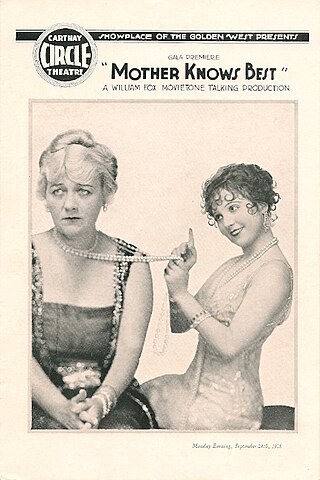Top Qs
Timeline
Chat
Perspective
Mother Knows Best (film)
1928 film From Wikipedia, the free encyclopedia
Remove ads
Mother Knows Best is a lost 1928 American sound part-talkie film directed by John G. Blystone, based on a novel by Edna Ferber, fictionalizing the life of vaudevillian Elsie Janis. The film was Fox's first part talkie, using the Movietone sound system which had primarily been used for synchronised music scores and effects tracks in Fox features beforehand, although as early as Mother Machree (1928), a single synchronous singing sequence was included in the film. The talking sequences in Mother Knows Best were directed by actor Charles Judels,[1][2] while the synchronized sequences were directed by John G. Blystone. The film starred Madge Bellamy, with Louise Dresser as her domineering mother, Barry Norton, and Albert Gran.[3]
Remove ads
Plot
Summarize
Perspective
Ma Quail (Louise Dresser), a domineering and ambitious woman in a small Midwestern town, is determined to make her daughter a star. From childhood, Sally Quail (Annette De Kirby as a child, Madge Bellamy as an adult) is pushed into the world of show business. Ma takes money from the family drugstore run by Pa Quail (Lucien Littlefield) to pay for Sally's dance and singing lessons, grooming her for the stage.
Sally performs in vaudeville as a mimic and impersonator, dazzling audiences with celebrity imitations and numbers like “I Just Can’t Make My Eyes Behave,” "My Mammy" and "She's Ma Daisy." Despite her growing fame, Ma continues to exert full control over her daughter’s life and career, refusing to let her develop independence or personal relationships.
When Sally falls in love with a gentle young composer (Barry Norton), Ma forbids the relationship. The young man leaves, heartbroken. Sally, devastated by her mother's constant interference, breaks down under the emotional strain and becomes seriously ill.
A doctor confronts Ma, warning her that Sally’s collapse is the result of years of psychological pressure and sacrifice. Ma, shaken, begins to realize the damage she has done. She seeks out the composer and invites him back into their lives. He returns, and Ma welcomes him with open arms, leading him into the room where Sally lies near death.
The young man’s presence revives Sally’s will to live. As she recovers, Sally prepares to take the Broadway stage under her own name, finally free from her mother’s control. The film closes with Sally triumphant in her own right, performing before an adoring crowd as Ma watches from the wings.
Remove ads
Music
The film featured a theme song entitled "Sally Of My Dreams" which was composed by William Kernell. In addition, Madge Bellamy sings three songs in the film. Dressed in kilts and carrying a crooked cane, she imitates Harry Lauder and sings "She's Ma Daisy" (Harry Lauder & J.D. Harper). Then, in blackface, she imitates Al Jolson and sings "My Mammy" (Walter Donaldson & Joe Young), and finally imitating Anna Held, while wearing an old-fashioned Victorian type long dress, she sings "I Just Can't Make My Eyes Behave" (Will D. Cobb and Gus Edwards).
Remove ads
Cast
- Madge Bellamy – Sally Quail
- Louise Dresser – Ma Quail
- Barry Norton – Boy
- Albert Gran – Sam Kingston
- Alyce McCormick – Bessie (*as Joy Auburn)
- Annette De Kirby – Bessie, as a child
- Stuart Erwin – Ben
- Ivor De Kirby – Ben, as a child
- Lucien Littlefield – Pa Quail
Unbilled
- Anne Shirley – Sally, as a child (*as Dawn O'Day)
- Billy Schuler

See also
References
External links
Wikiwand - on
Seamless Wikipedia browsing. On steroids.
Remove ads

